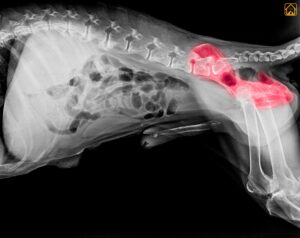What Is Heartworm Disease in Dogs?
Heartworm disease in dogs, caused by the parasite Dirofilaria immitis, is a potentially life-threatening condition. These parasites grow into long worms that live in a dog’s heart, lungs, and nearby blood vessels. Over time, they can cause severe lung disease, heart failure, and organ damage. Dogs are the natural host for heartworms, which means the worms mature, mate, and multiply inside them. If left untreated, a single dog can harbor dozens or even hundreds of these worms, each reaching up to a foot long!
While dogs are most commonly affected, heartworm disease in cats can occur, though it’s less common in cats. The key takeaway? Heartworm disease in dogs is progressive, often silent early on, and always preventable with proper care.
How Dogs Get Heartworm: Causes and Transmission
Heartworm disease in dogs starts with one small thing, a mosquito bite. That’s really all it takes. When a mosquito bites an infected animal (like another dog, fox, or even a wild animal), it picks up tiny baby heartworms called microfilariae. These baby worms grow inside the mosquito for a couple of weeks.
The next time that mosquito bites your dog, it passes the tiny larvae into your dog’s bloodstream. Once they enter into your dog’s body inside, the worms don’t just stay small, they slowly grow into adult heartworms over the next six months. These worms live in the lungs and heart and can seriously harm your dog’s health.
Dogs can’t catch heartworm disease from each other, mosquitoes are the only way the parasite spreads. So even if your dog stays indoors most of the time, they’re still at risk. Mosquitoes can easily fly into homes, especially during warmer months.
I remember chatting with a friend who thought her apartment pup was safe, only to be shocked when her vet diagnosed heartworms. Mosquitoes really don’t care about walls!
Stages and Progression of Heartworm Disease
Understanding how heartworm disease progresses can help you catch it early and protect your dog’s health. This condition develops slowly, often without any visible signs until the damage is already serious.
Stage 1: Silent Development
At first, there will be no symptoms. The immature heartworms are quietly growing inside your dog’s body, usually for about 6 months after the mosquito bite. Most pet parents don’t notice anything unusual at this stage.
Stage 2: Mild Symptoms
As the worms mature, your dog might start showing small signs like coughing once in a while or getting tired faster after walks. These early symptoms are easy to miss or brush off.
Stage 3: Clear Warning Signs
By now, the heartworms have started affecting the lungs and heart. You may notice frequent coughing, weight loss, tiredness even at rest, and breathing problems. This stage can bring real discomfort to your dog.
Stage 4: Advanced and Life-Threatening
In the final stage, the worm load is heavy. It can lead to heart failure, fluid buildup in the belly, and in some cases, sudden collapse. This is a medical emergency and requires immediate treatment.
The tricky part? Early stages can be completely silent. Honestly, it’s a little scary to think about how much damage can happen before your dog shows obvious signs.
Early Signs and Symptoms of Heartworm Disease
Spotting heartworm disease in dogs symptoms early makes a huge difference. The first signs are often subtle, so it’s easy to brush them off as tiredness or aging. Some common early symptoms include:
- Mild, persistent cough
- Reluctance to exercise or shortness of breath after activity
- Fatigue, especially after playtime
- Decreased appetite
- Weight loss
Ever noticed how your dog seems winded after a short walk? Or perhaps that soft, nagging cough at night? These could be the first signs of heartworms in dogs. Don’t ignore those little changes, they’re your pup’s way of asking for help.
Severe and Late-Stage Heartworm Disease: Advanced Symptoms & Complications
As heartworm disease in dogs progresses, symptoms become more dramatic and dangerous. Here’s what you might see in severe or end stage heartworm disease in dogs:
- Labored breathing and frequent coughing
- Swollen belly from fluid buildup (ascites)
- Fainting or sudden collapse
- Dark, coffee-colored urine
- Pale gums
- Severe lethargy or inability to stand
At this stage, complications like heart failure, liver or kidney damage, and blood clots can occur. I once saw a rescue dog in late-stage heartworm disease, he couldn’t even walk across the room without gasping for air. It was heartbreaking, but with quick intervention, his life was saved. Catching it before this stage is always the goal.
Diagnosing Heartworm Disease in Dogs
Wondering how vets find out if a dog has heartworm disease? The process may sound a bit technical, but it’s simple, painless, and very important for your dog’s health. Early diagnosis means better treatment options and a higher chance of full recovery.
Here’s how heartworm disease is usually diagnosed:
- Initial Blood Test: Vets begin with a heartworm antigen test. This checks your dog’s blood for proteins released by adult female heartworms. It’s quick and only needs a small blood sample.
- Follow-up Tests (if positive): If the test comes back positive, your vet may do more testing to understand how serious the infection is:
- Chest X-rays – to check if the heart and lungs are affected
- Ultrasound (Echocardiogram) – to see live worms or heart changes
- Additional Blood Work – to monitor organ health and overall condition
- Annual Heartworm Screening: Even if your dog is on regular heartworm prevention, yearly testing is still a must.
- Dogs can accidentally miss a dose
- Some may spit out or vomit the medication
- Prevention isn’t 100% foolproof without testing
Think of it like taking your car for a yearly check-up, it keeps things running smoothly and helps you catch problems before they get serious.
Heartworm Disease Treatment Options & Recovery
If your dog tests positive, don’t panic, heartworm disease in dogs treatment is possible, but it does require patience and careful management. Here’s what treatment usually involves:
Heartworm Disease Treatment Options
- Stabilization: If your dog is very sick, your vet may treat symptoms first before targeting the worms.
- Medications: Dogs receive a series of injections (Melarsomine) to kill adult heartworms. Antibiotics like doxycycline are often given to eliminate bacteria that help heartworms survive. Steroids may be prescribed to reduce inflammation.
- Exercise restriction: During treatment, rest is critical. Too much activity can cause dead worms to block blood flow, which can be fatal.
- Follow-up: After treatment, dogs are retested to confirm all worms are gone. Sometimes, lifelong medication for heart or lung damage is needed.
Heartworm treatment can be tough both emotionally and financially. Costs vary, but prevention is always more affordable than treatment. Recovery is possible, and many dogs bounce back with renewed zest once the worms are gone!
Heartworm Prevention: Best Practices and Medications
Heartworm disease in dogs prevention is easy and effective. Several FDA-approved medications are available as monthly chewables, topicals, or twice-yearly injections. Talk to your vet to choose what fits your dog’s needs and your lifestyle.
- Year-round heartworm prevention for dogs is recommended, no matter where you live.
- Reduce mosquito exposure by limiting outdoor time at dawn/dusk and using pet-safe repellents.
- Remember, missing even a single dose can put your dog at risk.
I once missed a month with my own dog, just one! Luckily, routine testing caught the infection early. Now, I set reminders and never skip a dose. Prevention is truly the best medicine.
Heartworm Disease in Dogs vs. Cats
While heartworm disease in dogs is common, cats can also be affected, though they’re less natural hosts. In cats, heartworms rarely mature into adults, but even immature worms can cause severe respiratory problems known as heartworm associated respiratory disease in dogs and cats. Unfortunately, heartworm treatment isn’t available for cats, so prevention is the only way to protect your feline companions.
FAQs About Heartworm Disease in Dogs
How common is heartworm disease in dogs?
Heartworm disease in dogs has been found in all 50 states, with higher risk in warm, humid areas. But anywhere there are mosquitoes, there’s a risk.
Can heartworm disease in dogs be cured?
Yes, with prompt treatment, most dogs can recover. Early diagnosis and treatment reduce the risk of lasting organ damage.
What are heartworm symptoms in dogs’ poop?
Heartworms don’t usually show up in a dog’s stool. Symptoms are more likely coughing, exercise intolerance, and weight loss. Bloody stool is rare and not a typical sign of heartworm disease in dogs.
Is heartworm prevention for dogs expensive?
Prevention is affordable compared to treatment, which can be costly and risky. Monthly prevention often costs less than a daily coffee habit!
How do I know if my dog needs heartworm prevention year-round?
Because mosquitoes can survive indoors and climates change, year-round heartworm disease in dogs prevention is recommended for all pets, no matter where you live.
What if I miss a dose of my dog’s heartworm medication?
Give the missed dose as soon as you remember, and let your vet know. Your dog may need a heartworm test in 6 months to be sure they’re still protected.
Are there natural ways to prevent heartworm disease in dogs?
No natural or home remedies are proven to prevent heartworm. Only FDA-approved medications, prescribed by your vet, are effective.
Conclusion
For more information on heartworm disease in dogs, check trusted sources like the American Heartworm Society. Worried about heartworm disease in dogs or have questions? Reach out to your vet immediately. Every dose of prevention is a step toward a longer, healthier life for your best friend.



